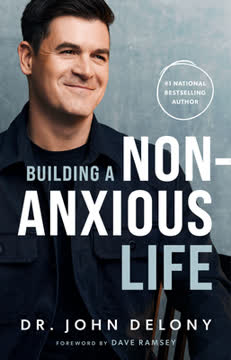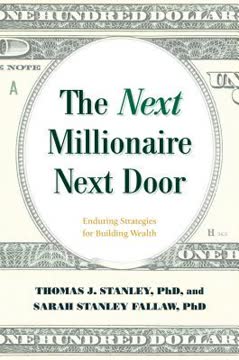Key Takeaways
1. The System is Designed to Keep You Broke.
The gap between financial stress and financial peace is littered with traps, myths, distractions, and slick marketing designed to keep you brainwashed and broke.
Financial stress is rampant. Many Americans feel trapped in a cycle of financial hopelessness, struggling to pay bills and worrying daily about money. This isn't just bad luck; it's often the result of a system designed to keep people reliant on debt and feeling out of control. External factors like inflation and rising costs play a role, but the core issue is often how we handle our money within this system.
Born into the system. From a young age, we're often not taught financial literacy but instead absorb a toxic money culture. This culture promotes ideas like needing a high credit score, financing everything, and seeing debt as normal or even beneficial. This sets people up for failure, leading to significant debt loads from student loans, cars, and homes before they even understand the consequences.
Break free from chains. The good news is you can opt out of this system. Recognizing the traps is the first step to taking back control. By understanding how the system works against you, you can make intentional choices to avoid debt, build wealth, and achieve true financial freedom, rather than being a passenger in an "Uber ride from hell."
2. Credit Scores & Credit Cards Are Debt Traps.
As it turns out, the credit score is just an ingenious way for lenders to lure you deeper into their web of debt while convincing you you’re doing great with money.
Credit scores measure debt. A high credit score doesn't mean you're good with money; it means you're good at managing debt. The score is calculated based on your debt history, amounts owed, and length of debt. Paying off debt can even lower your score, highlighting its focus on your relationship with lenders, not your net worth.
You don't need a score. Contrary to popular belief, you can live a full financial life without a credit score. Renting cars, apartments, getting insurance, and even mortgages are possible through manual underwriting or alternative verification methods. Having no score is different and better than having a low score.
Credit cards are not your friend. Credit card companies make billions primarily from interest and fees paid by those who carry balances, not from interchange fees or rewards. Rewards programs are designed to incentivize more spending, and studies show lower-income individuals often pay fees that subsidize rewards for higher-income users. Cutting up credit cards and using debit or cash removes temptation and aligns spending with actual money.
3. Student Loans Are the Worst Debt.
Student loans are selling the American Dream but delivering the American Nightmare.
A trillion-dollar crisis. Student loan debt in the US totals $1.6 trillion, carried by 43 million Americans, with the average borrower owing nearly $40,000. This debt takes decades to repay, often costing more than double the original amount due to interest. This crisis stems from government programs that made loans easy to get while colleges drastically inflated tuition.
Delayed dreams. This debt significantly delays major life milestones for young adults, including:
- Paying off other loans (42%)
- Getting married (14%)
- Saving for retirement (44%)
- Buying a home (33%)
- Having a baby (16%)
Avoid the trap. College is not the only path to success, and student loans are not a necessary "investment." Many jobs don't require a four-year degree, and not all degrees lead to high-paying careers. You can pay for college debt-free by choosing affordable schools, applying for scholarships/grants, saving in dedicated accounts (ESA, 529), and working while in school.
4. Car Loans & Risky Mortgages Steal Your Future.
If you think nobody cares if you’re alive, try missing a couple of car payments.
Cars are depreciating assets. Car loans total $1.58 trillion, surpassing student loan debt. Buying new cars on payments is financially destructive because new cars lose 60% of their value in the first five years, while you're still paying the loan plus interest. Dealerships profit more from financing and add-ons than the car itself.
Leasing is the worst. Leasing is the most expensive way to operate a vehicle, as you pay for the steepest depreciation without ever owning the asset. It involves hidden costs, fees, and strict terms, trapping you in a cycle of payments with nothing to show for it.
Mortgages can be "death pledges." While homeownership offers benefits, mortgages are the largest debt and can be risky. Avoid types like ARMs, FHA/VA/USDA (unless fee waived for vets), Construction, Subprime, Interest-Only, Reverse, Cash-Out Refi, HELOC, and HEL. These often involve higher costs, fees, or risks. The best approach is a 15-year fixed-rate conventional mortgage with at least 10-20% down, where the payment is no more than 25% of your take-home pay.
5. Investing Traps Prey on Your Weaknesses.
Greedy people try to get rich quick but don’t realize they’re headed for poverty.
Avoid get-rich-quick schemes. Many popular "investing" trends are actually speculation or gambling, preying on greed, fear, and pride. These include:
- Cryptocurrency & NFTs: Hype-driven, volatile, often scams.
- Permanent Life Insurance: High fees, low returns, sold by agents for commission.
- Single Stocks & Day Trading: High risk, most day traders lose money.
- Investing Apps & Micro-Investing: Gamify investing, encourage rash decisions, micro results.
Slow and steady wins. True wealth is built gradually through consistent, long-term investing. Avoid fear-based investments like precious metals or high-risk strategies like leveraged real estate.
Focus on proven methods. The best way to build wealth is through diversified investments like growth stock mutual funds within tax-advantaged retirement accounts (401k, IRA, etc.). This strategy, combined with patience and consistency, is how most millionaires build their wealth over time.
6. Marketing Fuels Spending; Self-Control is Key.
We buy things we don’t need, with money we don’t have, to impress people we don’t like.
Constant bombardment. We live in the most marketed-to culture ever, seeing thousands of ads daily across various platforms. Companies use sophisticated tactics like personal selling, product placement, brand association, sales, and convenient payment methods to influence our purchasing decisions and encourage spending.
Convenience increases spending. Frictionless payment methods like tap-to-pay, stored card info, and buy now, pay later (BNPL) make spending painless and increase the likelihood of impulse purchases. BNPL, in particular, is aggressively marketed and leads many to overspend and incur fees, despite promises of "financial breathing room."
Become a SMART spender. To combat consumerism and gain self-control, use a five-question filter before buying:
- Self-Awareness: Will it add value?
- Motive: Am I buying for the right reason?
- Affordability: Is it in my budget (can I pay cash)?
[ERROR: Incomplete response]
Last updated:
Review Summary
Breaking Free From Broke receives mostly positive reviews, with readers praising its humor, relatable content, and practical financial advice. Many appreciate the updated take on Dave Ramsey's principles for a younger audience. Critics note excessive product promotion and disagree with some investment advice. The book is commended for its easy-to-understand approach to getting out of debt and building wealth. While some find the content repetitive if familiar with Ramsey's teachings, others value the refreshed perspective and entertaining delivery, especially in audiobook format.
Similar Books










Download PDF
Download EPUB
.epub digital book format is ideal for reading ebooks on phones, tablets, and e-readers.




